

Plato's symposium character list - Recherche Google. The Symposium: Characters. Alcibiades. Athenian statesman.
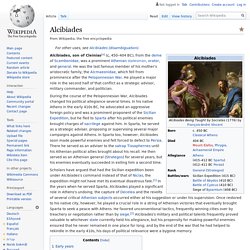
The three types of love greek. The Intriguing Origins of Aphrodite. Aphrodite is the Greek goddess of love, sex, and beauty.
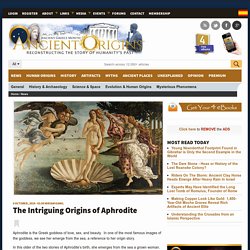
Mythology, Worship, & Art. Aphrodite, ancient Greek goddess of sexual love and beauty, identified with Venus by the Romans. The Greek word aphros means “foam,” and Hesiod relates in his Theogony that Aphrodite was born from the white foam produced by the severed genitals of Uranus (Heaven), after his son Cronus threw them into the sea. Aphrodite was, in fact, widely worshipped as a goddess of the sea and of seafaring; she was also honoured as a goddess of war, especially at Sparta, Thebes, Cyprus, and other places. However, she was known primarily as a goddess of love and fertility and even occasionally presided over marriage. Although prostitutes considered Aphrodite their patron, her public cult was generally solemn and even austere. Britannica Quiz Oh My Heavens: A Quiz. Sacred Haven Coven. Aphrodite, although now most associated with Greece, is originally a Semitic fertility/war Goddess, like Astarte or Ishtar.

According to Olympian myth, when Uranus, Spirit of the Sky, was castrated, his severed member, dripping with sperm and blood, dropped into the fertile sea. Aphrodite was born of this merger of sea and sky. She came ashore at Cyprus, carried to land on a large scallop shell. Fittingly for a sex Goddess, the Greek word kteis means “vulva” as well as “scallop”. The Symposium: 180c - 185c. Summary Phaedrus' speech is followed by a number of others that Aristodemus does not recall, and so we arrive at Pausanias.
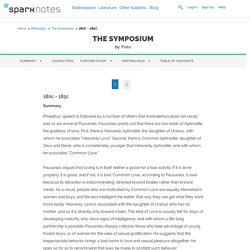
Aphrodite Pandemos. Aphrodite Pandemos (Ancient Greek: Πάνδημος; "common to all the people"), occurs as an epithet of the Greek goddess Aphrodite.
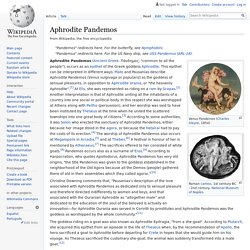
This epithet can be interpreted in different ways. Aphrodite Urania. Statue of the so-called 'Aphrodite on a tortoise', 430-420 BCE, Athens.[1] The most distinctively Western Asian title of the Greek Aphrodite is Urania, the Semitic "queen of the heavens".
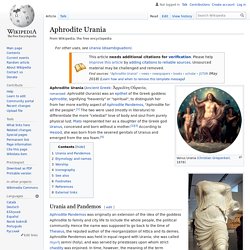
It has been explained by reference to the lunar character of the goddess, but more probably signifies "she whose seat is in heaven", whence she exercises her sway over the whole world—earth, sea, and air alike. Her cult was first established in Cythera, probably in connection with the purple trade, and at Athens it is associated with the legendary Porphyrion, the purple king. Aphrodite. Ancient Greek goddess of love Etymology Hesiod derives Aphrodite from aphrós (ἀφρός) "sea-foam", interpreting the name as "risen from the foam",[5] but most modern scholars regard this as a spurious folk etymology.
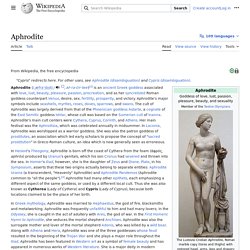
Early modern scholars of classical mythology attempted to argue that Aphrodite's name was of Greek or Indo-European origin, but these efforts have now been mostly abandoned. Phaedrus. Hector. Hector was a prince of Troy in Greek mythology, son of King Priam and Queen Hecuba.
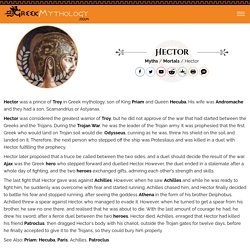
His wife was Andromache and they had a son, Scamandrius or Astyanax. Aeschylus. Ancient Athenian tragic playwright Aeschylus (,[1] ;[2] Greek: Αἰσχύλος Aiskhylos, pronounced [ai̯s.kʰý.los]; c. 525/524 – c. 456/455 BC) was an ancient Greek tragedian.
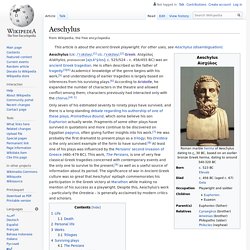
He is often described as the father of tragedy.[3][4] Academics' knowledge of the genre begins with his work,[5] and understanding of earlier tragedies is largely based on inferences from his surviving plays.[6] According to Aristotle, he expanded the number of characters in the theatre and allowed conflict among them; characters previously had interacted only with the chorus. [nb 1] Life[edit] Aeschylus was born in c. 525 BC in Eleusis, a small town about 27 kilometers northwest of Athens, which is nestled in the fertile valleys of western Attica,[10] though the date is most likely based on counting back forty years from his first victory in the Great Dionysia.
In 510 BC, when Aeschylus was 15 years old, Cleomenes I expelled the sons of Peisistratus from Athens, and Cleisthenes came to power. Death[edit] Works[edit] Sir J. Achilles and Patroclus: Brothers from Other Mothers or Passionate Paramours? A woman launched a thousand ships.
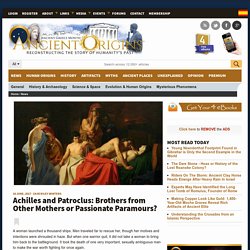
Men traveled far to rescue her, though her motives and intentions were shrouded in haze. But when one warrior quit, it did not take a woman to bring him back to the battleground. It took the death of one very important, sexually ambiguous man to make the war worth fighting for once again. Patroclus. Mythological Greek character Pronunciation of name[edit] There are at least three pronunciations of the name 'Patroclus' in English.[2] Because the penultimate syllable is light in Latin prose (pă′.trŏ.clŭs), the antepenult was stressed in Latin and would normally be stressed in English as well, for (analogous to 'Sophocles').[3] However, this pronunciation is seldom encountered: for metrical convenience, Alexander Pope had made the 'o' long, and thus stressed, in his translation of Homer, following a convention of Greek and Latin verse, and that pronunciation – of Latin pa.trō′.clus – has stuck, for English .[4] Moreover, because in prose a penultimate Greco-Latin short o (omicron) would only be stressed in a closed syllable, the penult has sometimes been misanalyzed as being closed (*pă.trŏc′.lŭs), which would change the English o to a short vowel: .[5] Family[edit] Mythology[edit] Early days[edit] During his childhood, Patroclus had killed another child in anger over a game.
Achilles and Patroclus. The relationship between Achilles and Patroclus is a key element of the stories associated with the Trojan War. Its exact nature has been a subject of dispute in both the Classical period and modern times. Greek Mythology: Achilles. Achilles by Ernst Wallis History >> Ancient Greece >> Greek Mythology What is Achilles known for?
Achilles was one of the greatest warriors and heroes in Greek Mythology. He was a major character in the Iliad by Homer where he fought in the Trojan War against the city of Troy. Achilles. Achilles, the son of Peleus and Thetis, was the greatest of all Greek heroes who took part in the Trojan War. Knowing that her child was destined to either die the death of a glorious warrior or live a long life in obscurity, Thetis bathed Achilles as an infant in the waters of the River Styx, thus making him all but immortal: only the heel by which she held him remained vulnerable. However, as prophesized, this proved costly, because Achilles eventually died from an arrow wound in that heel. Guided by Apollo, the fateful arrow was shot by Paris, the brother of Troy’s most celebrated hero Hector, whom Achilles had previously killed in a face to face duel, in an attempt to avenge the death of his closest friend, Patroclus.
Achilles’ Childhood and Early Career Achilles’ very birth is interlinked with two important prophecies: one about his mother, and another one about him. Myth, Significance, & Trojan War. Achilles. Myth, Symbol, & Meaning. Orpheus, ancient Greek legendary hero endowed with superhuman musical skills. He became the patron of a religious movement based on sacred writings said to be his own.
Orpheus and Eurydice. Orpheus. Roman mosaic depicting Orpheus, wearing a Phrygian cap and surrounded by the beasts charmed by the music of his lyre. Orpheus (/ˈɔrfiːəs/ or /ˈɔrfjuːs/; Ancient Greek: Ὀρφεύς) was a legendary musician, poet, and prophet in ancient Greek religion and myth. Alcestis. Alcestis in Greek Mythology - Greek Legends and Myths. Alcestis. Alcestis - Euripides - Ancient Greece - Classical Literature. Alcestis. Alcestis' father is Admetus 1's uncle. Alcestis. Alcestis sacrifices herself for Admetus by Heinrich Füger (1804-1805). Akademie der bildenden Künste, Vienna. Family[edit] Mythology[edit] Many suitors appeared before King Pelias and tried to woo Alcestis when she came of age to marry.
Alcestis. Greek mythology. Daedalus. Greek mythological figure. Eros. Hesiod. Parmenides. Symposium.